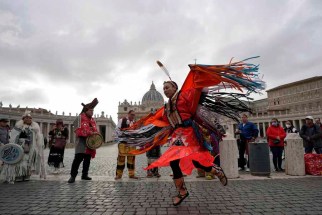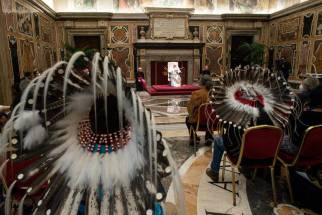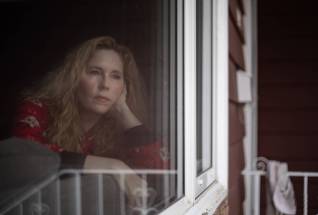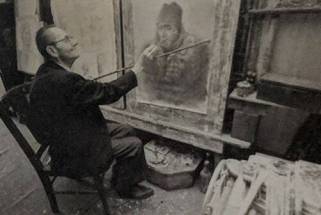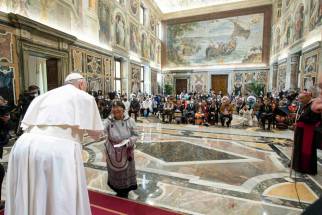A necessary step, but just one step
Read this article for free:
or
Already have an account? Log in here »
To continue reading, please subscribe:
Monthly Digital Subscription
$0 for the first 4 weeks*
- Enjoy unlimited reading on winnipegfreepress.com
- Read the E-Edition, our digital replica newspaper
- Access News Break, our award-winning app
- Play interactive puzzles
*No charge for 4 weeks then price increases to the regular rate of $19.00 plus GST every four weeks. Offer available to new and qualified returning subscribers only. Cancel any time.
Monthly Digital Subscription
$4.75/week*
- Enjoy unlimited reading on winnipegfreepress.com
- Read the E-Edition, our digital replica newspaper
- Access News Break, our award-winning app
- Play interactive puzzles
*Billed as $19 plus GST every four weeks. Cancel any time.
To continue reading, please subscribe:
Add Free Press access to your Brandon Sun subscription for only an additional
$1 for the first 4 weeks*
*Your next subscription payment will increase by $1.00 and you will be charged $16.99 plus GST for four weeks. After four weeks, your payment will increase to $23.99 plus GST every four weeks.
Read unlimited articles for free today:
or
Already have an account? Log in here »
Hey there, time traveller!
This article was published 01/04/2022 (1350 days ago), so information in it may no longer be current.
“Sorrow and shame.”
The acknowledgment of these sentiments, expressed on behalf of the Catholic church on Friday by Pope Francis in front of First Nations, Inuit and Métis delegations that had travelled to Vatican City seeking an apology for the church’s role in Canada’s residential school system, is a long-overdue next step in a process that has been far too slow to advance.
After a week of meetings with the delegations, the Pope offered a detailed apology that characterized as “deplorable” the conduct of some members of the church who worked in residential schools in Canada.
“It is chilling to think of determined efforts to instil a sense of inferiority,” the pontiff said, “to rob people of their cultural identity, to sever their roots, and to consider all the personal and social effects that this continues to entail: unresolved traumas that have become intergenerational traumas.
“I feel shame — sorrow and shame — for the role that a number of Catholics, particularly those with educational responsibilities, have had in all these things that wounded you, in the abuses you suffered and in the lack of respect shown for your identity, your culture and even your spiritual values.”
“It’s a historical first step. However, only a first step.”– Gerald Antoine, Dene National Chief
Pope Francis also repeated a promise made last year that he will travel abroad in the near future to reiterate the apology on Canadian soil (“I won’t come in the winter!”, he added, in the address’s sole moment of levity).
“Today is a day that we’ve been waiting for and certainly one that will be uplifted in our history,” said Dene National Chief Gerald Antoine. “It’s a historical first step. However, only a first step.”
More than 150,000 First Nations, Inuit and Métis children were forced to attend the schools between the 1880s and mid-1990s in a government-initiated effort to extinguish their culture and language. According to the Truth and Reconcilation Commission of Canada’s final report, more than 4,000 children died while in residential-school custody — a toll described as part of a “cultural genocide.”
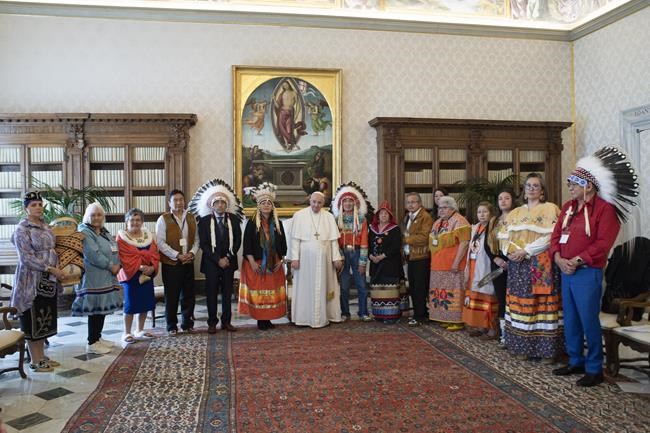
While the magnitude of Friday’s statement cannot be overstated, it must also be considered in the broader context of what has been done and what remains to be done in pursuit of reconciliation between First Nations, Inuit and Métis populations and the Catholic church, which was instrumental in Canada’s colonization and responsible for running more than 60 per cent of Canada’s residential schools.
The church has not yet responded to requests for the return of stolen artifacts and sacred objects that remain in the possession of the Vatican; nor has it revoked the centuries-old papal decrees that were used as justification for land and property seizures by colonizing forces. Formal reparations have not been offered, nor has the church been sufficiently active in the ongoing searches for unmarked graves on the grounds of former residential schools.
“Reconciliation did not start today with the Pope’s words of apology…and it certainly doesn’t end here, either.”– Cassidy Caron, president of the Métis National Council
As has been noted by numerous scholars, religious and otherwise, saying “I’m sorry” is only one element of an effective apology. The words must be followed by actions that indicate a determined willingness to make restitution, and an acknowledgment that the full weight of the apology will likely not be enough to reverse the damage that has been done.
Or, to put it in terms more familiar to the Catholic church, confession is necessarily followed by penance. And in the case of Canada’s residential-school trauma, what’s required is much more than a deftly delivered “I’m sorry” or any number of contrite Hail Marys.
The road ahead remains long. “Reconciliation did not start today with the Pope’s words of apology,” said Cassidy Caron, president of the Métis National Council. “And it certainly doesn’t end here, either.”
History
Updated on Monday, April 4, 2022 9:25 AM CDT: Corrects references to First Nations, Inuit and Métis people; corrects typo



